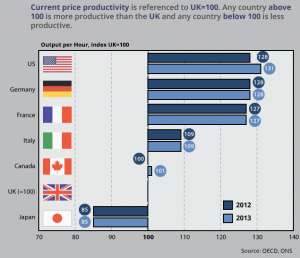The UK has a productivity problem when compared to other developed countries. The recession and its aftermath have not helped – despite our recent recovery, productivity is 15% behind where it would have been had the great recession not have happened.
Why is this a problem? It means that for every person working, less is being produced than would have been or could have been if we matched the most productive countries. That means a smaller economy, lower standards of living and poorer competitiveness to our competitors.
Productivity Data
Look at this infographic from the ONS in February 2013 (click on it to see a bigger version):
This shows us that in 2013, for every hour worked, the US produced 31% more output relative to the UK.
Put another way, if the UK had the levels of productivity of the US, we could all have gone home every week at some point on Thursday and had a 3 day weekend for the size of our current economy.
Various explanations have been mooted for this – one of the most convincing major contributions is that the UK traditionally has far lower levels of investment in business (automation etc.) and infrastructure (roads, rail etc) than other countries.
Considerations
However, there are a few other considerations that are important:
- The British commute further and for longer than citizens of many other countries;
- In the UK, we have a long hours culture – and evidence is that this reduces productivity per hour (concentration spans, tiredness);
- Related to the above, a preponderance to manage presence (hours) than performance (output);
Relatively low level work related IT skills; and - Take up of new consumer technologies in businesses for operations;
- Insufficient take up and application of innovation.
Cost Effective Improvements
Many of these factors can be resolved more cost effectively (not withstanding infrastructure investment which is critical):
- Reducing commuting times by reducing the need to commute: compacted working weeks, increased home working etc;
- Experimenting with other flexible and reduced working hours;
- Introducing more performance management culture – in particular amongst (a smaller cohort) of managers – with greater genuine empowerment of employees (this requires a significant culture shift in many organisations);
- Increase work place skills – not necessarily just through training, but through other channels such as peer 2 peer sharing and on the job experience;
- Improve change management, and take up of new technologies (with consumer technologies, these are subject to highly competitive price points);
- Drive innovation through the organization – both product and operational/back office – through a mixture of empowerment, reward and introduction of innovation capabilities and whole systems thinking.
In this way – we can drive productivity rapidly – whilst waiting for the (slower to implement) infrastructure investment to yield results.
These are just some of the challenges and solutions – if you want to learn more – contact Perform Green for a conversation on how we could help improve your organisation’s productivity.

